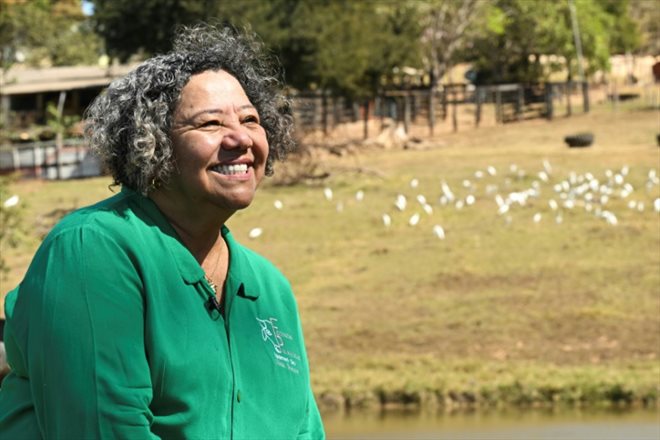Frenchman Christian Bajard and Brazilian Sonia Bonato are both farmers, but beyond the 9,000 km that separate them, they view a trade agreement between the European Union and Mercosur very differently (AFP/Archives/Jean -François MONIER)
Frenchman Christian Bajard and Brazilian Sonia Bonato are both farmers, but beyond the 9,000 km that separate them, they see a trade agreement between the European Union and Mercosur very differently.
This agreement “may endanger French agriculture, because we are not at all on the same farm scales”, sighs Mr. Bajard, breeder of Charolais cows in Saint-Symphorien-des-Bois, in Burgundy ( center-east).
In the bucolic setting of the Charolais-Brionnais terroir, his herd of 250 head of cattle grazes eight months a year in groves surrounded by hills.
The family farm, held before him by his father and grandfather, now covers 145 hectares, spread over different plots.
If the agreement between the EU and the four Mercosur countries (Brazil, Argentina, Uruguay and Paraguay) is ratified, he fears that it will disappear in the face of “unfair competition” from huge South American farms.
“We compare ourselves with farms of 5,000 to 10,000 head, so it’s not at all the same way of working,” he says.
“This will facilitate the entry of products that do not respect the same rules that are imposed on French producers”, particularly with regard to the use of chemical fertilizers and the traceability of meat.
“Somewhere, it’s hypocritical”, criticizes this member of the National Bovine Federation (FNB), section of the National Federation of Farmers’ Unions (FNSEA), the main French agricultural union.
– “Hard to get an income” –
According to him, French breeders “are already struggling to get an income” despite European aid from the Common Agricultural Policy (CAP), while the French cattle herd has decreased by 10% over the past six years.
There is concern ahead of the summit of Heads of State and Government of the EU and the Community of Latin American and Caribbean States (EU-CELAC), which takes place next week in Brussels.
Mercosur concluded a trade agreement with the EU in 2019, after more than 20 years of negotiations.
But this agreement has still not been ratified, partly due to European concerns about the environment. Very strong at the time of former far-right Brazilian president Jair Bolsonaro (2019-2022), they have persisted since his departure, to the chagrin of left-wing leader Luiz Inacio Lula da Silva, who returned to power in January in Brasília.
The agricultural component plans in particular to facilitate South American exports of soybeans, used to feed livestock in France, while increasing the share of meat from Mercosur that can be exported to Europe and its 450 million consumers for reduced customs duties.
– “Good product” –
On the other side of the Atlantic, this agreement is synonymous with hope for Sonia Bonato, who has been growing soybeans for 27 years in Ipameri, in the Brazilian state of Goias (center).
The soybean harvest has just ended, revealing the red soil of her farm which she operates with her husband Nilton, where there is also a barnyard and a few dairy cows.
In Brazil, soybean production is spread over three harvests. “For us it is a feeling of security to know that we will be able to sell our production (…). There are not enough people in Brazil to consume all the food that we produce here”, says the 66-year-old farmer, who wears a pendant in the shape of a cow’s head around her neck.

Brazilian farmer Sonia Bonato at her farm in Ipameri, Brazil, on July 13, 2023 (AFP/Evaristo Sa)
Faced with European concerns about the environment, she says Brazilian standards are “very rigorous” and are the guarantee of a “good product”.
More than a third of the 131 hectares are not exploited, constituting a protected area, particularly near waterways, in accordance with Brazilian law.
According to her, only a minority of Brazilian farmers illegally clear the rainforest, but this is enough to tarnish the country’s image abroad.
Ms. Bonato believes that the use of pesticides is still necessary in Brazil, even if she says she is in favor of a transition to less aggressive products.
“We live in a tropical country, where parasites proliferate much more than in countries where periods of frost offer natural protection,” says the Brazilian farmer.
“We can’t change everything at once because our production would drop a lot, natural products don’t have the same effects. But this change is not impossible,” she concludes.
© 2023 AFP
Did you like this article ? Share it with your friends with the buttons below.




